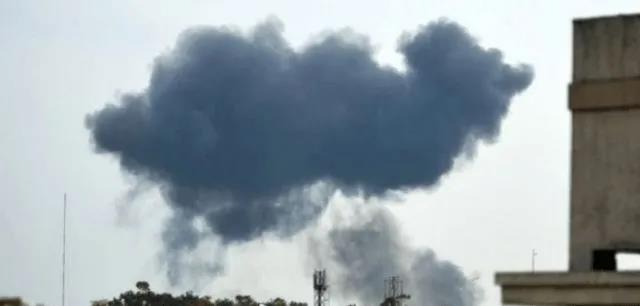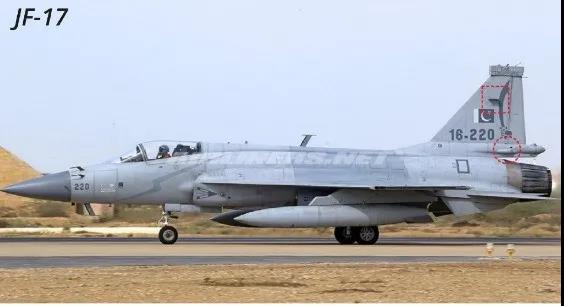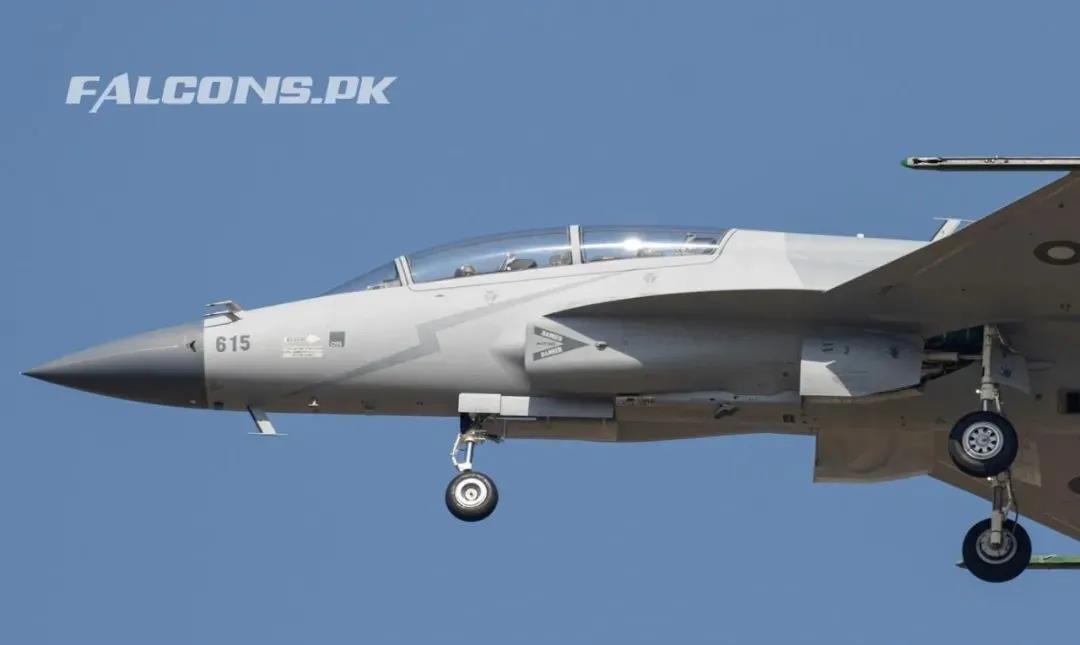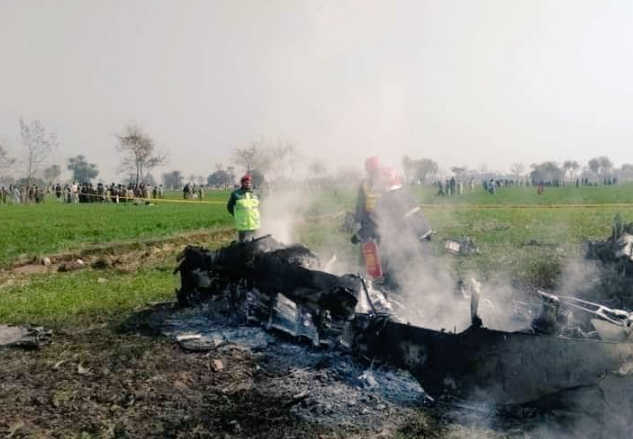Who is responsible for the crash of a brand new JF-17 dragon
Who is responsible for the crash of a brand new JF-17 dragon?
On August 6th, a JF-17B JF-17B JF-17B training plane of the Pakistani Air Force crashed during a routine training mission, and two pilots ejected to escape.
According to public reports, this is the fourth JF-17 fighter jet to crash in the Pakistan Air Force. The previous three incidents occurred in 2011, 2016, and 2020, all of which were single seat JF-17 fighter jets.

The recent two seater version of the JF-17, which crashed recently, was delivered as a brand new fighter jet. Although Pakistan is still investigating the cause of the accident, it is absolutely impossible that it was a common cause of the crash, such as "aging of the aircraft".
The JF-17 fighter jet is jointly developed and produced by China Chengfei and Pakistan, using Russian engines. Therefore, China and Russia are also highly concerned about this matter. If it is identified as their own fault, they will face claims and reputational losses.
The "Xiaolong" fighter jet, as a product jointly developed by China and Pakistan, originated from the "Sabre II" program between China, the United States, and Pakistan. Later, Russia intervened and provided certain technical support and power systems.
There are rumors that the Pakistani Air Force is not very satisfied with the "JF-17", and in the eyes of pilots who are accustomed to using American made F-16 fighter jets, at least the early performance of the "JF-17" was not outstanding. Moreover, it is equipped with the Russian made RD-93 engine, which has a gap in reliability, lifespan, and economy compared to American products. Of course, the practical performance of the later "Xiaolong" indicates that it is not inferior to the mid-range version of Western third-generation aircraft.

At the beginning of 2019, there was another border conflict between India and Pakistan. Pakistan shot down an Indian MiG-21 and captured the pilot.
The Pakistani military stated that both the F16 and the JF-17 participated in the battle at that time, but it is unclear who ultimately shot down the MiG-21. Military fans have put in a lot of effort to analyze but have not come up with an accurate answer.
In 2007, the Pakistani Air Force first equipped the "JF-17B" Block 1 model, and in 2017, it was equipped again with the "JF-17B" Block 2 model. The JF-17B is a two seater trainer model of Block 2, and the Pakistani Air Force has purchased over 100 various models of equipment.
The "Xiaolong" Block 2 model has added aerial refueling equipment and is equipped with KLJ7 flat slot antenna PD radar, which has multi-purpose combat capabilities such as air to ground control. For the Su-30MKI equipped by India with a detection range of over 130 kilometers, 50 Block 3 type aircraft will be purchased in the future, equipped with active phased array radar and long-range PL-15 missiles, theoretically capable of countering India's latest Rafale fighter jets.
At present, the JF-17 "JF-17" Block 2 fighter jet is the latest model of the Pakistani Air Force. In addition to equipping various conventional squadrons, it is also equipped with an independent training aircraft squadron. The 26 JF-17B "JF-17B" two seater fighter jets ordered by the Pakistani Air Force were all delivered last year.
This is a two seater aircraft with both coaching and combat functions, with coaching tasks as the main focus and combat tasks as auxiliary.

The dual seat project of the JF-17 fighter jet is actually a bit strange. It took more than ten years from the earliest single seat model to the dual seat model of the JF-17 fighter jet, while China's J-10S and J-10A fighter jets are almost like front and rear legs, separated by 2-3 years.
For over a decade without training aircraft, the training of JF-17 pilots was a major issue. Normally, without a two seater trainer aircraft, a ground simulator must be used.
The cost of a simulator for one hour is approximately several thousand yuan, while the cost of a real aircraft flight is in the 100000 yuan range, with a huge gap. However, the realism of a real aircraft cannot be achieved by a simulator, as it does not fly with overload, which is a drawback.
The US F-22 and F-35 fighter jets have phased out the two seater models and trained entirely on ground simulators, which has both advantages and disadvantages. The Pakistani Air Force followed the US for a while and ultimately decided that developing the JF-17 Dragon two seater model would be more suitable for training effectiveness.
When the Indian Air Force frequently crashes and consistently ranks first in the world rankings, its old rival, the Pakistani Air Force, has not performed well either.
For example, in 2020, the Pakistani Air Force crashed 5 fighter jets within a year, including valuable F-16, Mirage III, J-7, and JF-17 fighter jets. In terms of the size of the Israeli and Palestinian Air Forces, such scale crashes are not a small number.

Most of the crash accidents are related to the aging of the aircraft, and of course, mechanical failures and insufficient maintenance are also problems. Moreover, there has been a serious lack of funding and access to advanced fighter jets for a long time, forcing the Pakistani Air Force to compensate for the equipment gap with stricter training. Under the background of increased training intensity, falling accidents have become more frequent.
A total of four JF-17 aircraft crashed in Pakistan, but all pilots survived, indicating the reliable performance of their equipped Martin Baker ejection seats. Last year, after JF-17 pilots ejected and escaped, Martin Baker company even heavily promoted it. This is also the reason why Pakistan insists on using this British company's product on the JF-17 fighter jet.
Pakistani pilots fly particularly fiercely, often flying at the limits of their aircraft's performance, which is their core weapon for surpassing the Indian Air Force and even surpassing the Chinese Air Force.
The first time they got started with the new aircraft, they dared to fly wildly. The strongest records of many domestic aircraft were set by Pakistani pilots, but there are also hidden dangers behind this practice. Some crazy pilots even ignore the warnings in the aircraft manual and exceed the limit of flight during daily training, resulting in plane crashes.
A few years ago, in a plane crash, the wing of the aircraft tore from the auxiliary fuel tank hanger. The Pakistani Air Force demanded compensation from Chengfei. After static testing, it was found that the Pakistani Air Force pilot exceeded the limit of operation, the aircraft was full of fuel, and the auxiliary fuel tank was mounted. In the case of exceeding the weight limit, the operation limit was disconnected, exceeding the normal overload and angle of attack limits, ultimately leading to structural damage and aircraft destruction.

The nature of the two seater plane crash this time is serious, and the main reason is that the new plane crashed shortly after delivery. If it is found to be a design or manufacturing problem of the aircraft, the main manufacturer will be particularly embarrassed, followed by a large amount of compensation and damage to reputation. If it is a problem with Russia's RD-93 engine, the ultimate loss will be borne by the Russians.
If it weren't for the plane malfunction, it would likely be the responsibility of the Pakistani Air Force pilots. If that's the case, then the Pakistani side will bear all the losses themselves. Fortunately, there were no pilot losses, only a $30 million combat trainer plane crashed.
In fact, the JF-17 fighter family has experienced multiple plane crashes over the past 10 years of service, both due to engine malfunctions and reckless pilot operations. Overall, no crashes caused by flight control system issues have been found.
However, there are various reasons for the plane crash, and until the investigation results are available, everything is speculation, and none of the above reasons may be true.
For example, the US military crashed an F22 last year, and recent investigation reports have shown that it was caused by water entering the nose of the aircraft! Specifically, when the ground crew of the US Air Force was cleaning the F22, they did not put a special cover on the airspeed tube. After the airspeed tube was filled with water, it froze in the low temperature high altitude, causing the calculated data to be distorted. The onboard computer issued incorrect instructions based on the distorted data, resulting in the F22 lifting its head and increasing the angle of attack, ultimately losing control and crashing.
Source: Guoke Huanyu